Today is the Monday of Angels, also known as Pasquetta, or “Little Easter,” a celebration on the Italian calendar marked with a day off school. It commemorates the time that angels descended to the sepulcher of Jesus to explain his resurrection to the grieving women. Many countries that follow Western Christianity, including most of Christian Europe and Africa, have Little Easter as a holiday, though the US does not. READ what the Italians do…
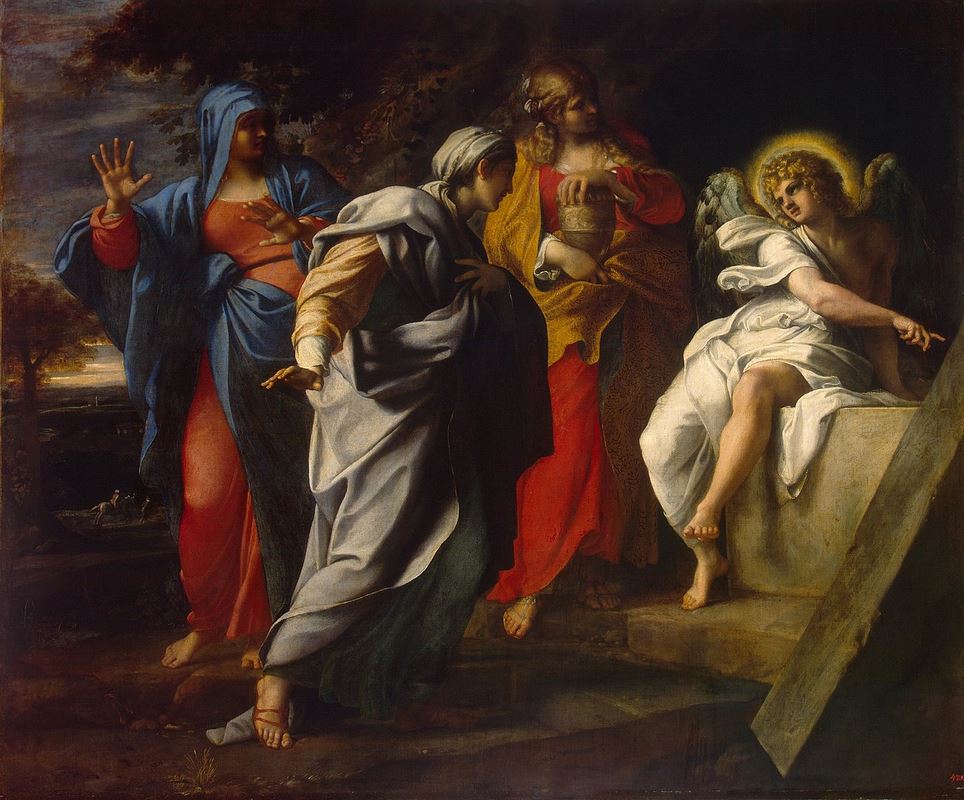
Apart from attending any relevant church services, Pasquetta is celebrated with short outdoor excursions, such as a trip into the mountains for cycling or sunbathing around a tarn. At home, and like the Easter Sunday lunch, Pasquetta is rung in with a very American tradition: the barbecue.
MORE Good News on this Date:
- Traditional date on which Romulus and Remus founded Rome (753 BC)
- Women gained voting rights in France (1944)
- Rollie Fingers of the Milwaukee Brewers became the first pitcher to record 300 saves (1982)
- Paul McCartney performed for the first time in Brazil at the Maracanã Stadium in Rio de Janeiro for 184,000 fans, smashing box office records and gaining him entry into the Guinness Book of World Records for Largest Concert Audience (1990)
- 24-year-old Irish singer-songwriter Sinéad O’Connor hit No.1 on the US singles chart with her version of Prince’s Nothing Compares To You (1990)
April 21st marks Groundation Day, when hundreds of thousands of Rastafari celebrate the arrival of Emperor Haile Selassie in Jamaica in 1966. The great significance of this event in the development of the Rastafari religion is that, having been outcasts in society, its adherents gained a measure of respectability for the first time. With Rasta having become acceptable, reggae music became commercially viable, leading in turn to the further global spread of Rastafarianism. READ what the Marley’s thought… (1966)
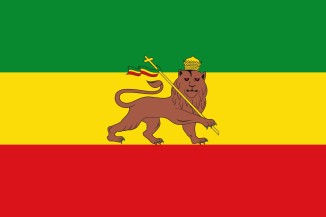
Rita Marley, Bob Marley’s wife, converted to the Rastafari faith after seeing Haile Selassie in his motorcade en route to the King’s House. She claimed, in interviews and in her book No Woman No Cry, that she had seen a stigma on Haile Selassie’s hand as he waved to the crowd
When Haile Selassie’s Ethiopian Airlines flight landed at the airport at 1:30 pm, the crowd surrounded his plane on the tarmac. The day had been overcast and stormy. After about half an hour, the door swung open and the emperor appeared at the top of the mobile steps. A deafening tumult was heard from the crowd, who beat calabash drums, lit firecrackers, waved signs, and sounded Abeng horns.
All protocol was dropped as the crowd pressed past the security forces and onto the red carpet that had been laid out for the reception. Selassie waved from the top of the steps; some interpreters have claimed that he shed tears, although this is disputed. He then withdrew back into the plane, disappearing for several more minutes.
Finally, Jamaican authorities were obliged to request Ras Mortimer Planno, a well-known Rasta leader, to climb the steps, enter the plane, and negotiate the Emperor’s descent. When Planno reemerged, he announced to the crowd: “The Emperor has instructed me to tell you to be calm. Step back and let the Emperor land.”
243 years ago today, the city of Bangkok is believed to have been officially founded after changing hands during a military campaign, and the subsequent reorganization of the city on the more strategic east bank of the Chao Praya River. At the time it was called Rattanakosin, and the country Siam. It was founded by King Rama I, the founder of the Chakri Dynasty which still rules Thailand today.
It’s often hard in history to precisely date things like the founding of a city, since so many of the world’s large cities sit upon territory that for obvious reasons has been occupied going back sometimes five or even six thousand years. In this case, we have the Held: the city pillar of Bangkok. A city pillar is a Thai tradition, and the one established at once-Rattanakosin, has the date, and even the time of day, the site was declared a city.
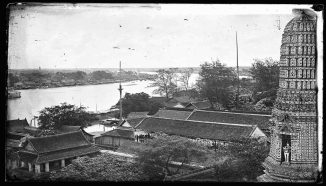
It’s believed that people would achieve prosperity and fulfillment in their work and career, avoid misfortune, and improve their luck, power, and prestige if they took a bow and paid their respects at this sacred place. The shrine is in the heart of Bangkok, opposite the grand palace in the southeast corner of the Sanam Luang Park, near the Defense Ministry. WATCH the history of Thailand explained in 5 minutes… (1782)
Elvis Presley’s first million-seller, Heartbreak Hotel, reached number one on the Billboard Top 100, dominating the charts for 7 weeks.
The eight-bar blues tune, co-written by Tommy Durden and Mae Boren Axton—with credit also going to Presley—was inspired by a newspaper article about the suicide of a lonely man jumping from a hotel window. Featuring guitarist Chet Atkins, and pianist Floyd Cramer, the record achieved feats unheard of, as it reached the top 5 of the Country and Western, Pop, and Rhythm ‘n’ Blues charts simultaneously.
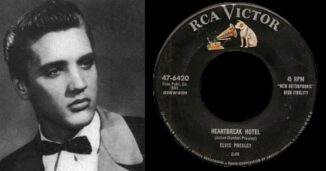
Certified double platinum, Heartbreak Hotel was inducted into the Grammy Hall of Fame, and was ranked by Rolling Stone magazine as one of the ‘500 Greatest Songs of All Time.’ John Lennon said it made his “hair stand on end,” with all the “bluesy stuff going on”. Keith Richards said that Presley’s sound was the first rock and roll he’d heard, and the “silence” was what impressed him, especially in the song’s open: “Since my baby left…” It was also a “life-changing” experience for George Harrison and Led Zeppelin’s Robert Plant. (1956)
Also, 209 years ago today, Charlotte Brontë, the author of Jane Eyre was born.
The novelist and poet was also the sister to Emily Bronte who penned Wuthering Heights, and Anne who also wrote with her sisters from early childhood. When Charlotte was 30, the trio self-financed the publication of their first book, a joint collection of poems. They used fictitious names, to hide the fact that they were women, which would surely be used against them by critics. See more by Charlotte in this book list. (1816)
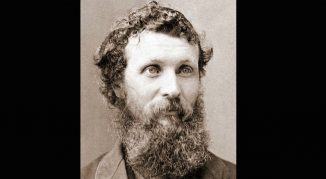
And, 187 years ago today, John Muir, the naturalist and conservationist known as the “Father of the National Park,” was born. The influential Scottish-American glaciologist and author who was read by millions wrote about nature and his adventures in the Sierra Nevada and his beloved Yosemite. His activism helped to preserve that valley, along with Sequoia National Park and many other wilderness areas. He also co-founded the Sierra Club, which continues his environmental efforts to this day. WATCH a video… (1838)
And, 376 years ago today, in the new American colony of Maryland, the Toleration Act was passed by the Assembly to allow freedom of worship throughout the state. It protected Catholics against Protestant harassment, which had been on the rise since Oliver Cromwell’s power in England increased.
It was the second law requiring religious tolerance in the British colonies (following Rhode Island) and a pioneering statute on the topic of protecting Catholic settlers and those of other religions that did not conform to the dominant Anglicanism of Britain. The Calvert family, who founded Maryland partly as a refuge for English Catholics, sought the enactment of the law. (1649)
SHARE the Milestones, Memories, and Music…



















